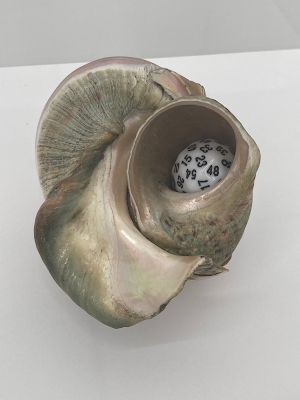An impossible infinite (Morse) sequence?
Hello Math-Fun,
We would like to introduce here a sequence that might stop somewhere –or not–, leaving us dubious anyway about its computability.
We will use the Morse code for the digits, as illustrated here and below in the red square:
A term T of the sequence S counts the dits used so far in S (including the dits present in the term T).
We can start S with a(1) = 1 (as 1 is coded by *----, one dit, four dahs).
But S immediately stops there. No a(2) can be found if we start S with a(1) = 1.
With a(1) = 2, we can unlock and extend S (2 is coded by **---, two dits, three dahs).
We lexicographically get:
S = 2,6,8,9,...
And here we arrive at our first crossroads, which has six lanes. We can indeed extend S after a(4) = 9 with a(5) = 10, 11, 12, 13, 14 or 15 (for a 2-digit number N, or more, we simply keep the sum of the dits used by the full set of N's digits; the integer 15, for instance, uses six dits: one for 1 = *---- and five for 5 = *****)
After a short exploration of the above branches, we notice that a(5) = 15 is the only choice we have to extend S further than a(7):
S = 2,6,8,9,15,18,20,26,29,36,40,47,56,60,67...
We reach another crossroads here, as after a(15) = 67 we can extend S with a(16) = 70, 71, 72 and 73 for instance. We keep 73 as it seems that this integer is the smallest we have to reach 89:
S = 2,6,8,9,15,18,20,26,29,36,40,47,56,60,67,73,78,80,86,89,...
... with another crossroads; we notice that 90, 91, 92 stop the sequence almost immediately – but 93 leads us to 99... at another 6-lane crossroads:
S = 2,6,8,9,15,18,20,26,29,36,40,47,56,60,67,73,78,80,86,89,93,97,99,100,...
S = 2,6,8,9,15,18,20,26,29,36,40,47,56,60,67,73,78,80,86,89,93,97,99,101,...
S = 2,6,8,9,15,18,20,26,29,36,40,47,56,60,67,73,78,80,86,89,93,97,99,102,...
S = 2,6,8,9,15,18,20,26,29,36,40,47,56,60,67,73,78,80,86,89,93,97,99,103,...
S = 2,6,8,9,15,18,20,26,29,36,40,47,56,60,67,73,78,80,86,89,93,97,99,104,...
S = 2,6,8,9,15,18,20,26,29,36,40,47,56,60,67,73,78,80,86,89,93,97,99,105,...
Etc.
We didn't explore S further.
Questions:
— Might S be extended as far as one wishes? Or is an impasse coming soon?
— Does the backtracking procedure ruin the possibility that such a sequence could exist [because a term in the future might force us to erase a lot of a(n)s that we hoped were good and final]?
(Please accept my apologies if this is old hat – and for the inevitable typos left in this message.)
Best,
É.






Commentaires
Enregistrer un commentaire